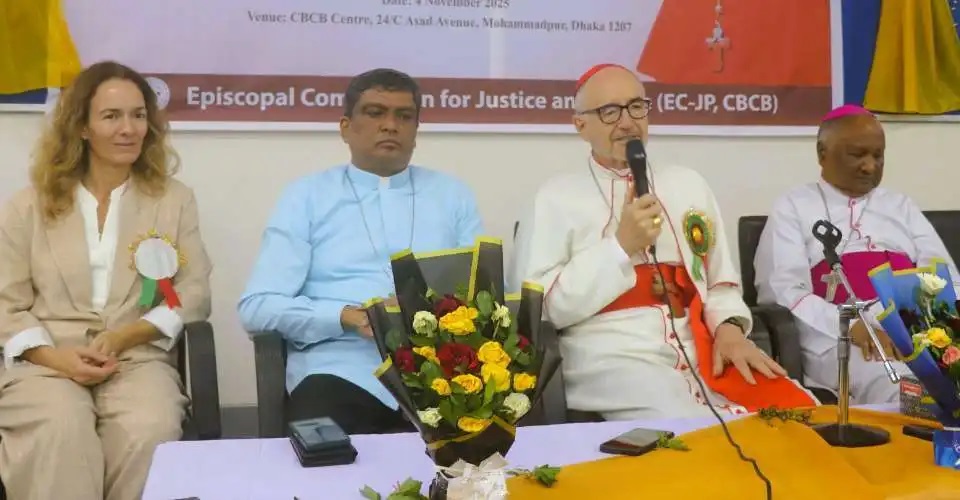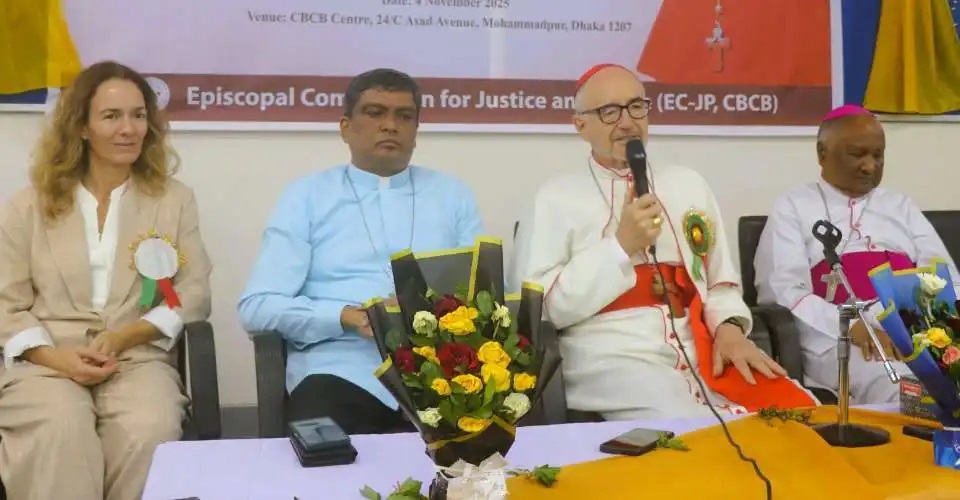By 2050, Bangladesh will have about 20 million internal climate migrants, says World Bank
Nov 07, 2025

Cardinal Michael Felix Czerny (second-right), prefect of the Vatican’s Dicastery for Integral Human Development, speaks during a press conference at the Catholic Bishops Conference of Bangladesh (CBCB) center in the capital Dhaka on Nov. 4. (Photo: CBCB Commission for Justice and Peace)
VATICAN: A top Vatican official has promised to speak on behalf of the climate-vulnerable poor nations, such as Bangladesh, at the UN Climate Conference (COP30) scheduled to start on Nov. 10 in Brazil.
Cardinal Michael Felix Czerny, prefect of the Vatican’s Dicastery for Integral Human Development, who is on a visit to Bangladesh, said this at a press conference in the national capital, Dhaka, on Nov. 4.
The Church “will be very much present” in the conference and seeks “to speak up on behalf of Bangladesh and other countries who are the innocent victims of the choices, policies, and lifestyles of other countries,” he said.
The victims of climate change suffer because of “international injustice,” which stems from the wrong policies of developed countries, he told media people gathered at the Catholic Bishops’ Conference of Bangladesh center.
The Czech-born Canadian cardinal, on a Nov. 1-5 visit, earlier joined the 50-year celebrations of the bishops’ Commission for Justice and Peace.
As part of his programs, he also met with internally displaced people, street children, Rohingya refugees, and Christian community leaders.
The Church wants to “bring the voice of those who suffer to the attention of those who are making the decisions and who are benefiting from the choices that are being made,” said Cardinal Czerny.
He said the Church tries to help the world recognize its obligations and understand climate risk for millions of people “on a planetary level.”
“Otherwise, there is no future for us as a human family,” he added.
A report by the International Monetary Fund predicts that Bangladesh could lose more than one-seventh of its landmass and nearly one-third of its food production due to sea level rise by 2050. It also warned of climate-driven migration from the country’s coastal areas.
According to the Geneva-based Internal Displacement Monitoring Center, natural disasters displaced 14.7 million people within Bangladesh from 2014 to 2023, and many people likely also moved in response to slow-moving impacts such as sea-level rise.
Environmentalists lament that industrialized nations, which are more responsible for global warming and climate change, have neither cut greenhouse gas emissions nor released promised funds to support vulnerable nations like Bangladesh.
As of August 2024, 110 countries have pledged a net-zero carbon emission target for 2050 and beyond, covering about 88 percent of global greenhouse gas (GHG) emissions. However, only 27 countries and the European Union, representing 16 percent of global GHG emissions, have enshrined these targets into law.
The Organization for Economic Cooperation and Development (OECD) countries pledged at the 2015 Paris Climate Agreement to finance $100 billion annually to the developing countries, but that pledge remains largely unfulfilled.
Meanwhile, in January, President Donald Trump withdrew the USA from the Paris climate agreement and cut USAID funding, leaving millions of people globally affected.–ucanews.com
